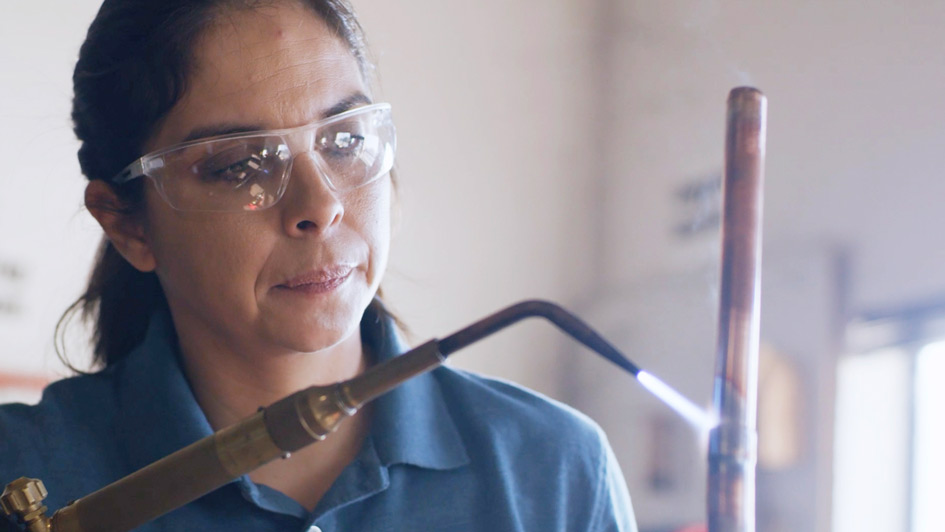
When you’re looking for quality HVAC services, you likely want a technician that understands what they’re doing. Lots of service companies advertise expert staff, but how can you know for sure? One of the best ways to check if an HVAC technician has experience is by checking their certifications. HVAC certifications should demonstrate proficiency in services like air conditioning repair, installation and maintenance services as well as other core aspects of the industry.
There are many HVAC certifications available. Some concentrate on a core body of knowledge technicians should possess, while others are a result of industry standards for energy efficiency and sustainability. We’ll review key details about a few of the most common HVAC certifications you’ll see in your search for services.
North American Technician Excellence Certification
The North American Technician Excellence certification is the largest program for HVAC proficiency, with tens of thousands of certified technicians. Other organizations like the ACCA and the federal Environmental Protection Agency work with the NATE program to standardize the certification testing. To pass, applicants must meet a minimum score of 70%. To maintain NATE certification, technicians must receive continuing education or retake an exam every two years.
Full certification is a multiyear process made up of four separate tests. The first two are specific for entry-level technicians while the second set of exams provide full certification along with senior-level status:
- Ready-to-Work Certificate – This certificate provides core knowledge and skill sets that can reaffirm any education or training already completed. The Ready-to-Work certification is particularly beneficial for recent graduates of trade programs.
- HVAC Support Technician Certificate – After 6 to 12 months of experience, this exam is offered to test proficiency on fundamental topics relevant to full NATE certification.
- Core and Specialty Certification – After a technician has been in service for two or more years, they can achieve NATE certification. Participants will need to pass both the core exam as well as a specialty exam for installation or servicing specific types of HVAC products.
- Senior-Level Efficiency Analyst Certification – Senior status is the highest NATE certification offered. Technicians should be certified in two specialty services—one in heating and one in air conditioning—to be eligible to apply for the senior certificate.
American Society of Heating, Refrigerating and Air Conditioning Engineers Certification
The American Society of Heating, Refrigerating and Air Conditioning Engineers was created in 1894. ASHRAE and its members provide research and education about HVAC systems with the intent to encourage sustainability, energy efficiency and high indoor air quality. Through their efforts, ASHRAE creates industry standards with federal recognition. These standards apply not only to HVAC equipment, but to the buildings themselves as well as their other systems.
Most of ASHRAE standards are concerned with commercial properties and industrial facilities, as they frequently have the highest rates of energy expenditure. They’ll study how HVAC system design can be improved as well as how equipment should be installed and maintained. ASHRAE also researches how the engineering and architectural design of the building itself affects energy use.
Air Conditioning Contractors of America Certification
Another national HVAC accreditation organization, the ACCA stands for Air Conditioning Contractors of America. This organization promotes rigorous training and hosts sessions for members to attend both on-site and online. Contractors looking for accreditation have two programs to pick from:
- The Existing Homes Program for Residential Service and Installation (RSI): This track ensures technicians can install, replace and maintain HVAC equipment common in residential properties including homes and apartments.
- The New Homes Program: The New Homes track specializes in designing and installing HVAC systems with ENERGY STAR®-certified equipment for qualifying homes. Random audits are performed to make sure members maintain their expertise.
ICE
Industry Competency Exams are offered by NATE to make sure technicians meet industry standards for entry-level (one year or less) experience. These are separate from the NATE certification exams but cover similar topics. Testing is provided for residential HVAC equipment as well as light commercial heating and cooling. Separate tests are even available for commercial refrigeration.
To be ICE-certified for residential equipment, technicians will have to pass both a core exam as well as specialty sections for services like furnace installation, service or even knowledge of components. Commercial ICE certifications don’t include the core exam and will review all relevant knowledge rather than specialty sections.
EPA Section 608
The Environmental Protection Agency provides comprehensive regulations for the HVAC industry. One of the most well-known sets of regulations is the federal Clean Air Act. Under Section 608 of the Clean Air Act, the EPA requires technicians who work with equipment capable of releasing refrigerants to pass a certification test. To earn the Section 608 Technician Certification, the test should be specific to the systems the technician works with and administered by an approved organization.
HVAC Excellence
The HVAC Excellence Certifications of Achievement are made up of a broad range of competency tests for varying levels of proficiency in the HVAC industry. For example, the Heating, Electrical, Air Conditioning Technology (H.E.A.T.) + student outcome assessments are offered for high school students who have completed qualifying HVAC education programs. Additional testing is available for those seeking employment as well as for experienced technicians seeking Professional or Master Specialist accreditation.
The Benefits of Certified HVAC Technicians
When you receive service from technicians who are certified by organizations like NATE, ASHRAE and the ACCA, you’re giving your HVAC system a better standard of service. Benefits of choosing certified HVAC technicians include:
Demonstrates proficiency and dedication: Technicians who are committed to their customers’ sense of comfort will seek out certifications to improve their expertise. When you see a service company in Beaverton offering NATE- or ICE-certified staff, you’ll know they go the extra mile to improve their services such as air conditioning installation.
Can help lower costs and speed up services: Professionals who spend the time and resources required for these certifications often take up less time and fewer resources when servicing your equipment. Not only can things like furnace repair, maintenance and installation proceed more quickly, but the faster progress can also lower labor expenses.
If you’re looking for certified HVAC services in Beaverton, consider requesting an appointment with All Solutions Heating & Cooling. Get in touch by giving us a call at 971-245-2459 today.



